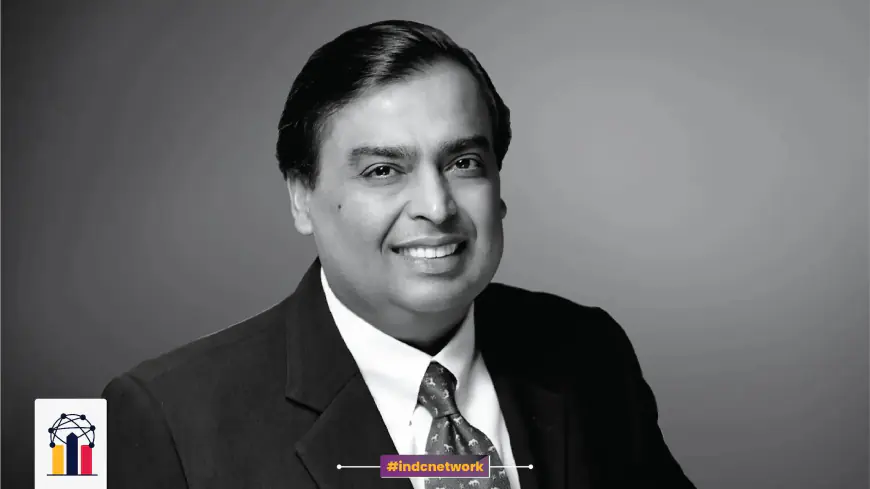Mukesh Ambani: The Visionary Leader Who Revolutionized Reliance Industries and Indian Business Landscape
Mukesh Ambani, the Chairman and Managing Director of Reliance Industries, is one of the most influential and wealthiest business leaders in the world. His leadership has transformed Reliance from a traditional textile and petrochemicals company into a diversified global conglomerate with interests in petrochemicals, refining, retail, telecommunications, and digital services. Mukesh Ambani’s innovative approach, particularly with the launch of Reliance Jio, has reshaped India's telecommunications landscape and positioned Reliance Industries as a key player in India’s economic growth. This biography delves into his early life, rise in the Reliance Group, his business strategies, and the impact he has had on India and the global business stage.

INDC Network : Biography : Mukesh Ambani: The Visionary Leader Who Revolutionized Reliance Industries and Indian Business Landscape
Early Life and Education
Mukesh Dhirubhai Ambani was born on April 19, 1957, in Aden, Yemen, to Dhirubhai Ambani and Kokilaben Ambani. Dhirubhai Ambani, the founder of Reliance Industries, was a pioneering entrepreneur who started his career as a yarn trader in Aden and later returned to India to establish Reliance Commercial Corporation in 1958. Mukesh was born into a middle-class family with humble beginnings, but by the time he was a teenager, his father’s business acumen had propelled Reliance into the forefront of India’s textile industry.
In 1958, the Ambani family moved back to India, settling in Mumbai (then Bombay), where Mukesh grew up. He attended the Hill Grange High School on Peddar Road in Mumbai, along with his younger brother Anil Ambani. Mukesh then went on to study at St. Xavier’s College, Mumbai, before enrolling in the prestigious Institute of Chemical Technology (ICT), formerly the University Department of Chemical Technology (UDCT). There, he earned a Bachelor’s degree in Chemical Engineering.
Mukesh Ambani’s academic journey did not end in India. He enrolled at Stanford University in the U.S. for an MBA program, but his education was interrupted when his father called him back to India to assist in expanding Reliance’s polyester business. Mukesh left Stanford in 1980 without completing his MBA, a decision that would prove pivotal in the growth of Reliance Industries and his eventual rise as one of the world’s most influential business leaders.
Joining Reliance: The Polyester and Petrochemicals Expansion
Mukesh Ambani’s entry into Reliance Industries in 1981 marked the beginning of a transformative era for the company. At the time, Reliance was primarily focused on textiles, and Dhirubhai Ambani had a vision of expanding into petrochemicals, a move that was seen as bold and unconventional.
Mukesh Ambani was given the responsibility of overseeing the polyester business, a sector that was growing rapidly in India. He was instrumental in setting up Reliance’s first major petrochemical plant, located in Patalganga, Maharashtra. His involvement in the project marked his initiation into the world of large-scale manufacturing and helped lay the groundwork for Reliance’s expansion into one of the largest petrochemical companies in the world.
One of Mukesh’s key early contributions was his deep involvement in Reliance’s backward integration strategy. Under his leadership, Reliance moved upstream from textiles to manufacturing polyester fibers and into the petrochemical industry. This backward integration helped Reliance control the entire value chain—from crude oil refining to producing end products like textiles and plastics—giving the company a significant competitive advantage.
The Creation of Jamnagar Refinery: A Milestone in Global Oil and Gas
One of Mukesh Ambani’s most ambitious and game-changing projects was the construction of the world’s largest oil refinery at Jamnagar, Gujarat. In the mid-1990s, as Reliance expanded into the energy sector, Mukesh spearheaded the development of a massive integrated refinery and petrochemical complex.
In 1999, the Jamnagar refinery was commissioned with an initial capacity of 660,000 barrels per day (bpd), making it the largest refinery in the world at that time. Over the years, the refinery’s capacity has expanded, and today, Jamnagar processes over 1.2 million barrels per day. It also features advanced technology that allows Reliance to process a wide variety of crude oil, which provides flexibility and cost advantages in a competitive global market.
The success of the Jamnagar refinery established Reliance as a global leader in the oil and gas industry and solidified Mukesh Ambani’s reputation as a visionary industrialist capable of executing large-scale, complex projects.
Diversification into Telecom: The Birth of Reliance Jio
Perhaps the most significant and transformative initiative under Mukesh Ambani’s leadership was the launch of Reliance Jio, a disruptive telecommunications venture that revolutionized the Indian mobile and internet industry.
In 2016, Reliance Jio was officially launched, offering 4G LTE services at unprecedented low prices. Jio’s entry into the market was characterized by its aggressive pricing strategy, which provided free voice calls, data services, and a host of other digital offerings at a time when the Indian telecom industry was dominated by a few large players. The initial free offering of data and calls attracted millions of subscribers, and within just a few months, Jio became the fastest-growing telecom operator in the world.
Jio’s impact on India’s digital landscape cannot be overstated. Before its launch, mobile data prices in India were among the highest in the world. Jio’s entry drastically reduced data prices, making internet access affordable for millions of Indians and triggering a massive digital revolution. This democratization of data access spurred growth in various sectors, from e-commerce and digital payments to online education and entertainment.
Reliance Jio’s success has not only made Reliance Industries a dominant player in the telecom sector but has also positioned India as one of the largest and fastest-growing digital economies in the world. By 2021, Jio had over 400 million subscribers and had diversified into a range of digital services, including Jio Fiber (broadband services), Jio TV, Jio Cinema, and JioSaavn (music streaming). Mukesh Ambani’s vision of a digital India became a reality through Jio’s unprecedented growth.
Reliance Retail: Transforming India’s Consumer Market
Mukesh Ambani’s leadership has also been instrumental in the growth of Reliance Retail, which has emerged as one of the largest retail chains in India. Launched in 2006, Reliance Retail initially focused on food and grocery retailing but has since expanded into multiple sectors, including consumer electronics, fashion, and lifestyle products.
Reliance Retail operates a wide range of store formats, including Reliance Fresh (grocery), Reliance Digital (electronics), Trends (fashion), and many more. Under Mukesh Ambani’s guidance, Reliance Retail has built an extensive network of physical stores across India, and it continues to dominate the Indian retail sector with its wide array of products and competitive pricing.
A significant milestone in Reliance Retail’s journey came in 2020 when Mukesh Ambani secured investments from global giants such as Facebook, Google, and private equity firms like KKR and Silver Lake for Reliance’s digital platforms and retail businesses. These investments not only provided financial strength but also highlighted the global confidence in Mukesh Ambani’s vision for the future of digital commerce and retail in India.
Philanthropy and Social Impact
Mukesh Ambani’s leadership in business has always been accompanied by a strong commitment to social responsibility. Reliance Industries, under his stewardship, has undertaken numerous initiatives aimed at improving the lives of millions of Indians.
Through the Reliance Foundation, headed by his wife, Nita Ambani, the company has made significant contributions in the fields of education, healthcare, rural development, and disaster relief. The foundation runs several schools, supports educational scholarships, and operates the Dhirubhai Ambani International School, one of India’s leading educational institutions.
In healthcare, the Reliance Foundation has played a critical role in improving access to medical services in rural and underserved areas. It operates mobile health clinics, conducts health awareness programs, and supports initiatives aimed at combating malnutrition and providing maternal and child healthcare.
During the COVID-19 pandemic, Mukesh Ambani played a key role in India’s response. Reliance Industries converted its manufacturing facilities to produce essential medical supplies such as personal protective equipment (PPE), face masks, and ventilators. The company also set up the country’s first dedicated COVID-19 hospital in Mumbai and donated significant funds to aid the government’s pandemic relief efforts.
Mukesh Ambani’s philanthropic endeavors are deeply rooted in his belief that business success must be accompanied by social good. His vision of inclusive growth has guided Reliance’s efforts to improve the quality of life for millions of people across India.
What's Your Reaction?













































































































































































